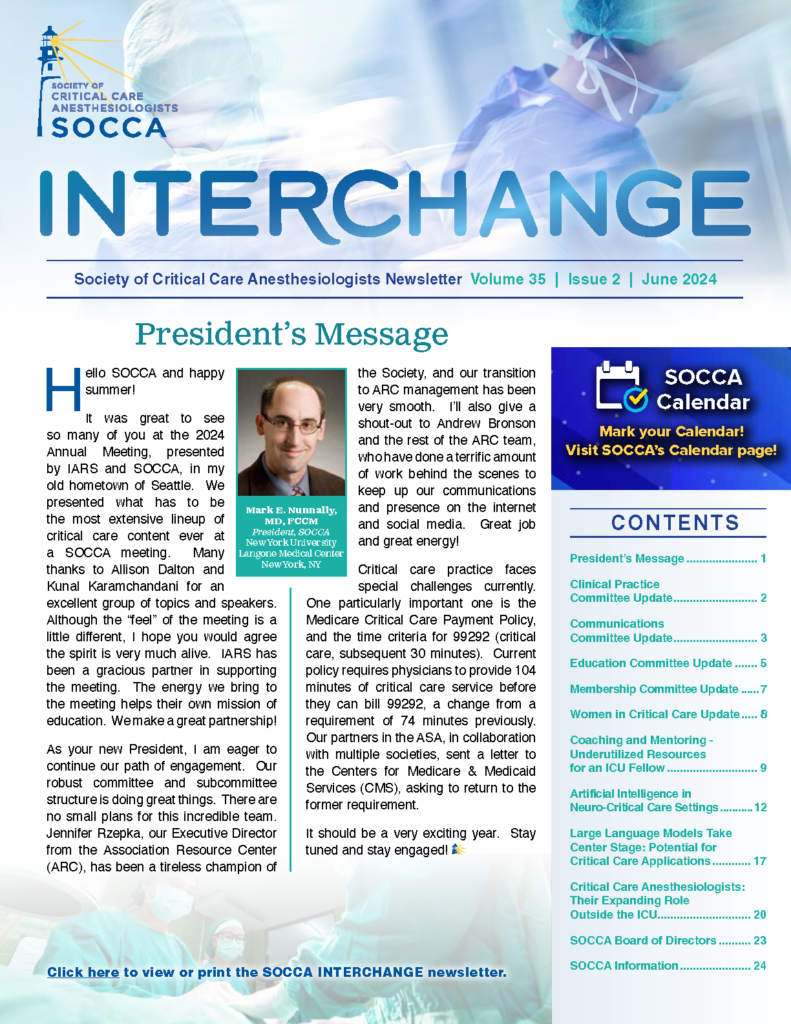Clinical Practice Ad Hoc Committee Update
The Clinical Practice Ad Hoc Committee (CPC) of the Society of Critical Care Anesthesiologists (SOCCA) was created to foster collaboration across subspecialties and enhance engagement among SOCCA members. Established as an ad-hoc committee, the CPC aims to integrate various subspecialties into joint projects with SOCCA, thereby broadening the scope of expertise and enriching the collective knowledge within the society.
Gozde Demiralp, as the Chair of CPC, along with Alok Gupta as the Vice Chair, will continue to expand and develop the robust structure of CPC. Currently, we have established six specialized workgroups. Each workgroup aims to focus on a subspecialty or necessity within the scope of a critical care anesthesiologist. The purpose is to see if these workgroups can sustain interest and expand into a committee structure or if they will be time-limited for a specific purpose and rest after achieving a particular goal. We will all wait and see!
We would like to briefly introduce these workgroups to you:
The “Quality and Patient Safety Workgroup” aims to advance perioperative patient safety for all critically ill patients. It plans to bring ICU professionals interested in this arena together to share resources for quality improvement (QI) projects and QI research and, hopefully, create a QI library to be the network for QI and safety protocols for all critical care providers. Somnath Bose leads this workgroup as Chair, and Joy Chen is Vice Chair.
The “MCS/ECMO/CTICU Workgroup” of CPC/SOCCA is uniquely positioned to spearhead the development of a comprehensive educational framework and curriculum for managing mechanical circulatory support (MCS) within critical care and perioperative medicine. The first primary focus of this workgroup will be to create an educational curriculum for mechanical circulatory support management for critical care medicine fellows and intensivists eager to gain expertise. The plan is to collaborate with ELSO in creating many workshops, courses, and training modules that target current or future critical care physicians and are accessible to all CCM fellowship program sizes and locations. By establishing this, they hope to contribute to a standardized education to ensure that all CCM fellowship graduates achieve competency in MCS management. This workgroup is chaired by Lovkesh Arora, accompanied by Laura Sutherland as Vice Chair.
The “Neurocritical Care Workgroup” is dedicated to targeting an audience of specialists who primarily care for critically ill patients with acute neurological conditions. They will be seeking collaboration with the Society of Neuroscience in Anesthesiology and Critical Care (SNACC). The aim is to learn from each other’s practice models and present a SWOT analysis report to a larger interest group. Discovering neurologist-neurosurgeon-anesthesia intensivist ratios within fellowship programs is another interesting topic in which this workgroup would like to invest. This workgroup is being developed by Ozan Akca (Chair) and Elizabeth Mahanna (Vice Chair).
Obstetrical emergencies are every intensivist’s biggest scare. The “Obstetric-Critical Care Workgroup” will dedicate its effort to collaborating with the Society of Obstetric Anesthesia and Perinatology (SOAP) resources while concentrating on the unique challenges faced by pregnant patients in critical care settings. This group works on developing guidelines and best practices for managing severe obstetric complications, ensuring both maternal and fetal safety. Ioannis Angelidis (Chair) and Emily Naoum (Vice Chair) lead this group.
The “Transplant Anesthesia Workgroup” collaborates closely with the Society for the Advancement of Transplant Anesthesia (SATA) to develop educational materials and clinical practice guidelines. Their goal within 1-2 years will be to enhance professionals’ knowledge base and clinical skills across the entire spectrum of transplant perioperative care. They aim to achieve this by creating comprehensive educational resources and establishing evidence-based guidelines to improve patient outcomes in all phases of transplant perioperative care. This workgroup is led by Dr. Ranjit Deshpande (Chair) and Megan Rashid (Vice Chair).
The “Physiologically Difficult Airway Taskforce” was created by Drs. Kunal Karamchandani and Craig Jabaley and expanded into an international expert group. This phenomenal group is publishing its first consensus statement on airway management for critically ill patients. They also delivered a fantastic panel at the Annual Meeting in Seattle this year. At the 2024 Annual Meeting, this task force was requested to continue as a workgroup due to overwhelming interest and ongoing projects. Current chairs of the PDA Workgroup are Kunal Karamchandani and Craig Jabaley, along with Mary Jarzebowski as Vice Chair.
Lastly, the newest workgroup of CPC is the “Global Critical Care Workgroup”, which extends SOCCA’s reach beyond national boundaries, addressing global disparities in critical care. The aim is to bring together an already enlarging group of anesthesia intensivists for global projects while trying to recruit more members. This group promotes international collaboration, resource sharing, and the development of universally applicable critical care practices, as well as creating awareness of increasing global fellowships. This group will be started by Vanessa Moll (Chair) and Ana Crawford (Vice Chair).
The CPC’s efforts and output have the potential to play an instrumental role in advancing SOCCA’s mission- Creating a more interconnected and engaged community of critical care anesthesiologists. Through its diverse workgroups, the CPC not only addresses current challenges in critical care anesthesiology but also anticipates future trends, ensuring that SOCCA members remain at the forefront of the field.
For more inquiries, please do not hesitate to contact us!



































